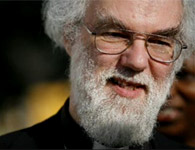A faithful and "active sexual relationship between two people of the same sex" is "in a way comparable to marriage," Archbishop of Canterbury Rowan Williams is said to have written in a private correspondence before he was appointed leader of the global Anglican church in 2002.

Archbishop of Canterbury Rowan Williams
The UK Independent newspaper say the leak is now "seen as a last-ditch attack on Dr Williams's authority" and is expected to spark a fresh row.
In the letters, he described how his view began to change from that of opposing gay relationships in 1980 to believing that biblical prohibitions on homosexuality were targeted at "heterosexuals looking for sexual variety in their experience" and that the Bible did not denounce faithful relationships between people who happened to be gay.
"By the end of the 1980s I had definitely come to the conclusion that scripture was not dealing with the predicament of persons whom we should recognise as homosexual by nature. I concluded that an active sexual relationship between two people of the same sex might therefore reflect the love of God in a way comparable to marriage, if and only if it had about it the same character of absolute covenanted faithfulness," he wrote.
His position on same-sex relationships is however not new as he had told BBC in a 2002 interview that "faithful" homosexual relationships do not conflict with the teachings of the Bible. "If the Bible is very clear - as I think it is - that a heterosexual indulging in homosexual activity for the sake of variety and gratification is not following the will of God, does that automatically say that that is the only sort of homosexual activity there could ever be? ...My own personal conclusion is that I can see a case for acknowledging faithful same sex relationships."
On Aug 3, Dr Williams closed the once-a-decade Lambeth Conference attended by 650 Anglican leaders by urging the Church's hierarchy not to consecrate any more openly gay bishops or perform same-sex blessings failing which, the 77-million-member church would be "in grave peril."
At the last Lambeth Conference held in 1998, the conference passed resolution 1.10 on Human Sexuality which declared "homosexual practice as (being) incompatible with scripture" and advised against "legitimising or blessing of same sex unions nor ordaining those involved in same gender unions."
Dr Williams further appealed to some 200 bishops who had boycotted the gathering over the consecration of the first openly gay bishop, Gene Robinson of New Hampshire in the US in 2003 to re-engage with the church. Robinson was not invited to the conference but he was in Canterbury to attend events on the conference fringes.
Conservative leadership from Kenya, Nigeria, Rwanda and Uganda as well as Australia and the US had threatened to form a breakaway fellowship over the appointment of gay and bishops by organising a separate conference in Jerusalem in June this year.
